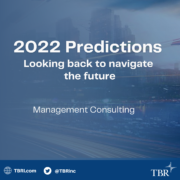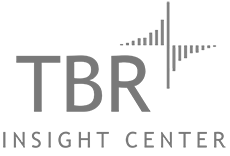Changing the norm: Consultancies reimagine portfolios and talent composition
Consultancies continue to evolve portfolio offerings and business structures to better align resources with client needs while also integrating technology within traditional services offerings.
Facing pressures from competitors more experienced in leveraging AI, analytics and cloud adoption for clients’ digital transformations, Big Four firms must balance talent composition around technology and consulting to support the shift in business models to better retain clients and deliver on emerging needs brought out from digital adoption. Additionally, talent composition shifts as traditional consulting units split from tax and audit businesses will create disruption for vendors, freeing opportunities with new clients but also changing competitive landscapes.
While the outlook for management consulting has not drastically changed since December 2021, firms have reoriented their market positioning by establishing business units dedicated to software and technology. The split of EY’s consulting and audit businesses will have a significant impact on the management consulting market, changing the way competitors view EY as well as the way the firm engages with its clients. The change will likely help create opportunities for consultancies with a deeper set of capabilities that address business processing needs as well as touch resource management, portfolio structure and strategy development, all underpinned by technology.
Prediction No. 1: Expanded capabilities require expanded skills, leading consultancies to increasingly invest in education
Senior Analyst Kelly Lesiczka: Changing client needs have led consultancies to transform their portfolios to better align with software and technology services and solutions. As a result, talent composition around technology and engineering staff versus traditional consulting and advisory staff has moved away from historical organizations to support R&D and innovation efforts.
For example, consultancies have maintained or accelerated their acquisition pace, with EY planning to acquire up to 25 firms during the year and McKinsey acquiring four firms thus far. Consultancies will continue to leverage acquisitions as well as partnerships to grow technology-oriented talent, which will help accelerate clients’ post-pandemic transformations and increase their use of digital and software platforms. The acquisitions deliver a mix of technology talent, such as engineers, data scientists and architects, to better work with clients to pinpoint data needs and drive insights.
Training also remains a core piece of vendor strategies to expand talent capabilities, helping to deepen industry and technology skills. Leaning on existing programs with a focus on training hours enables vendors to better grow in-house technology skills.
For example, Accenture is running two parallel tracks with its resource management programs. The first track is to recruit and/or train staff with skills that can provide immediate support in areas such as cloud, evidenced by the launch of a talent hub in Albany, N.Y., focused on training recruits on Salesforce technologies. The second track is to build a pipeline of recruits through earn-and-learn models (i.e., without traditional degree requirements).
Focusing on talent development specialized around technology solutions has remained a core piece of vendors’ resource management strategies. As services remains a people business, the need to invest in talent will dictate whether vendors fall behind, maintain pace with or accelerate ahead of peers, particularly as demand to address a wider range of services from business operations to technology maintenance continues to expand.
Prediction No. 2: Restructuring throes and woes will continue to constrain some management consultancies’ ability to execute consistently
Kelly: Vendors have looked at ways to optimize operations, including resource management of talent and staff and business practice restructuring. The realignments allow vendors to deepen expertise more easily within different business areas and equip specialized talent to deliver on varying needs. The trend has held true thus far through 2022 as vendors add on and spin out certain business areas.
For example, in May news spread that EY was considering splitting its audit and consulting businesses as the firm hoped to not only address potential conflicts of interest between the two business units but also open up opportunities to partner with vendors it could not previously, such as Amazon Web Services, Google and Salesforce.
In September EY confirmed it would move forward with the split, with plans for EY’s consulting business to go public and provide tax, business advisory and technology adoption services while the remaining legacy EY continues to deliver audit services.
Consultancies recognize the need to transform their business operations to better capitalize on upcoming opportunities and be best positioned to compete for engagements that leverage a hybrid of traditional services and newer technology solutions.
While the Big Four firms will not likely consider massive business spinouts moving through the remainder of 2022 and into 2023, vendors will continue to reorganize business operations work more seamlessly internally, particularly as the consultancies establish flexible in-person and remote working plans for staff.
Prediction No. 3: Sustainability booms for consultancies poised to measure, benchmark and report clients’ progress
Kelly: Sustainability grows as a primary investment area for clients, leading consultancies to grow their resources as well as establish internal programs to respond to energy consumption and greener technology usage. In 2022 consultancies have looked to partners and acquisitions to deepen knowledge around sustainability tracking as well as different ways to implement more efficient technologies. As regulations change around sustainability tracking, including measuring and reporting to publicize metrics, consultancies are quickly growing their resources to audit energy use.
Deloitte acquired Carbon Care Asia’s advisory business to strengthen its consulting capabilities around sustainability and carbon services in the region. The purchase of the sustainability consultancy will bolster Deloitte’s portfolio offerings across environmental, social and governance (ESG) reporting, climate scenario analysis, net-zero carbon solutions and sustainability research for clients across Hong Kong and Asia Pacific.
Additionally, Boston Consulting Group (BCG) looks to grow its resources to support the strategic development of sustainable solutions. The firm opened a Climate and Sustainability Hub in Asia to focus on facilitating partnerships, driving green ventures, and developing new capabilities and solutions.
To support this effort, BCG also grew its network partnerships, such as with CDP to focus on net-zero goals through the use of the CO2 AI Product Ecosystem platform, and will further integrate sustainable practices within the supply chain for clients.
Predictions is an annual TBR series examining market trends and business changes in key markets. 2022 covered segments included cloud, telecom, devices, data center, and services & digital.

 Technology Business Research, Inc.
Technology Business Research, Inc.
 Technology Business Research, Inc.
Technology Business Research, Inc. Technology Business Research, Inc.
Technology Business Research, Inc.